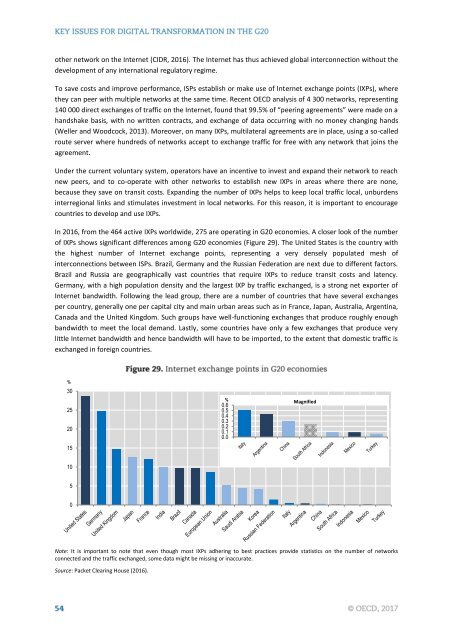KEY ISSUES FOR DIGITAL TRANSFORMATION IN THE G20
2jz0oUm
2jz0oUm
Create successful ePaper yourself
Turn your PDF publications into a flip-book with our unique Google optimized e-Paper software.
other network on the Internet (CIDR, 2016). The Internet has thus achieved global interconnection without the<br />
development of any international regulatory regime.<br />
To save costs and improve performance, ISPs establish or make use of Internet exchange points (IXPs), where<br />
they can peer with multiple networks at the same time. Recent OECD analysis of 4 300 networks, representing<br />
140 000 direct exchanges of traffic on the Internet, found that 99.5% of “peering agreements” were made on a<br />
handshake basis, with no written contracts, and exchange of data occurring with no money changing hands<br />
(Weller and Woodcock, 2013). Moreover, on many IXPs, multilateral agreements are in place, using a so-called<br />
route server where hundreds of networks accept to exchange traffic for free with any network that joins the<br />
agreement.<br />
Under the current voluntary system, operators have an incentive to invest and expand their network to reach<br />
new peers, and to co-operate with other networks to establish new IXPs in areas where there are none,<br />
because they save on transit costs. Expanding the number of IXPs helps to keep local traffic local, unburdens<br />
interregional links and stimulates investment in local networks. For this reason, it is important to encourage<br />
countries to develop and use IXPs.<br />
In 2016, from the 464 active IXPs worldwide, 275 are operating in <strong>G20</strong> economies. A closer look of the number<br />
of IXPs shows significant differences among <strong>G20</strong> economies (Figure 29). The United States is the country with<br />
the highest number of Internet exchange points, representing a very densely populated mesh of<br />
interconnections between ISPs. Brazil, Germany and the Russian Federation are next due to different factors.<br />
Brazil and Russia are geographically vast countries that require IXPs to reduce transit costs and latency.<br />
Germany, with a high population density and the largest IXP by traffic exchanged, is a strong net exporter of<br />
Internet bandwidth. Following the lead group, there are a number of countries that have several exchanges<br />
per country, generally one per capital city and main urban areas such as in France, Japan, Australia, Argentina,<br />
Canada and the United Kingdom. Such groups have well-functioning exchanges that produce roughly enough<br />
bandwidth to meet the local demand. Lastly, some countries have only a few exchanges that produce very<br />
little Internet bandwidth and hence bandwidth will have to be imported, to the extent that domestic traffic is<br />
exchanged in foreign countries.<br />
%<br />
30<br />
25<br />
20<br />
15<br />
0.6 % Magnified<br />
0.5<br />
0.4<br />
0.3<br />
0.2<br />
0.1<br />
0.0<br />
10<br />
5<br />
0<br />
Note: It is important to note that even though most IXPs adhering to best practices provide statistics on the number of networks<br />
connected and the traffic exchanged, some data might be missing or inaccurate.<br />
Source: Packet Clearing House (2016).


